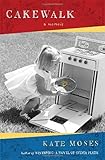 “I’m scared you’ll never forget, that you’ll remember all of the bad things forever,” Kate Moses’ brother admits to her just before she leaves for college. Luckily by then Kate knows she wants to be a writer, and her memory is the very thing that gives her purpose. Her new book, Cakewalk, is the fruit of her remembering—a memoir of life and baking, recipes included.
“I’m scared you’ll never forget, that you’ll remember all of the bad things forever,” Kate Moses’ brother admits to her just before she leaves for college. Luckily by then Kate knows she wants to be a writer, and her memory is the very thing that gives her purpose. Her new book, Cakewalk, is the fruit of her remembering—a memoir of life and baking, recipes included.
This plump book begins and ends with marriage. Though sprinkled with sweet recipes, the bitter moments are plentiful: as a child Moses is jammed between an overbearing, dramatic mother and a nonverbal, resentful father. With two brothers, her mother tells Kate (who she calls Cis) “We’re the only girls. We have to stick together.” Happy memories include a Coconut Layer Cake for her fifth birthday at the Howard Johnson’s across from Disneyland. But it isn’t long before her mother pleads “Cis you have to help me. You have to help me get out of this.” In the year that follows, her mother puts a deadbolt on her door, locks herself in and bails-out on her domestic duties altogether. “My father ate nothing but Campbell’s alphabet soup and toast for about a year . . . My mother hadn’t eaten in years, subsisting on Tab, cigarettes, thyroid medication, and over-the-counter diet pills. I baked.” For Moses, baking represented a brief reprieve from the relentless tension between her parents.
Finally, they divorce. After Moses’ nervous breakdown at college, the book really begins to motor and take shape as an energetic coming of age, with delightful stories of literary celebrities, romance, and freedom. Moses recalls this period in her life with such aplomb that her joy is immediately transferred to the reader. Her talent for lyricism and whimsy comes in handy as she describes falling in love with her college boyfriend’s family, particularly with his mother, Nell, a fantastic cook. “Nell had baked aromatic Bosc pears with curls of lemon zest and dots of butter, then served them in a pool of warm butterscotch sauce. Everyone at the table scraped their plates clean, moaning with happiness.” For her birthday, Nell bakes Kate a spiced pecan cake. At school, her college professor Arlen Hansen, takes her under his wing, encouraging her to write. “It wasn’t Paris,” Moses writes, “but between my weekends at Nell’s and sitting under the columns with Arlen, my life felt like a moveable feast.”
Meanwhile, her parents’ roles have flip-flopped. Her father apologizes to her and they move towards reconciliation. Her mother, on the other hand, slips into a reckless life of neglect fueled by psychosis. When Moses goes to visit and cleans out the refrigerator, her mother responds, “How dare you! How dare you touch anything that’s mine! I paid money for this food and it’s mine!” Though Moses tries to explain that the food was rotten and that she’s replaced it with new food, her mother throws her out of the house. As she leaves, Moses realizes she has to let go of any hope for a relationship. In her rearview mirror she sees her mother “In reflection—just as she had always seen me. And then I could see only the hillside of forgotten strawberries . . . I saw them there as I drove away: small clotted hearts struggling to survive, dangling on their stems among the weeds.”
While there are triumphs, picnicking at M.F.K Fisher’s house (including a recipe for her Persimmon Parfait with Walnut Black-Pepper Biscotti), at twenty-six Moses is devastated by a failed marriage and her new role as a single mother. “I honestly couldn’t remember who I had been before motherhood . . . Whatever accomplishment, talent, identity I’d finessed in the last few years had evaporated into thin air, leaving no trace.” Struggling to survive, she finds a job, but her income is so precarious she doesn’t eat when her son is with her husband for the day. No doubt Moses drew on this experience to write her last book, Wintering, on the final weeks of Sylvia Plath. She wonders: “Could you die from this? Could you die from being this afraid and lonely and forsaken?”
In these final chapters the message of the book reveals itself. Moses remembers the people who helped her, women from her neighborhood who baked her Blondies and dried her tears, striking up a friendship with her famous neighbor Kay Boyle, the man who would eventually become her second husband, walking through the door, ecstatic at the fact that Moses’ son is glad to see him. She forgives her father, who by now has begun a new family. At her wedding Moses remembers: “I turned from my new husband, flushed with a stunning joy, and there was my father. I saw him as if from behind the lens of a camera—the individual frames of his approach to me, his arms opening, his pale blue eyes glistening with tears, the roughness of his beard against my cheek.” Moses has captured a brilliant moment of forgiveness, which culminates in a recipe for “My Father’s Favorite Cheesecake.”
Though the book is a bit unwieldy and long, it is beautifully written. And while Moses’ story could certainly stand on its own as a straightforward memoir, the baking reflects her “struggle to find a way to redeem with sweetness those moments that left, however bitter on occasion, such a lasting taste in my mouth.” The presence of the pastries reminds us of the importance of experience, that through work and forgiveness, one can make life into something sweet.




